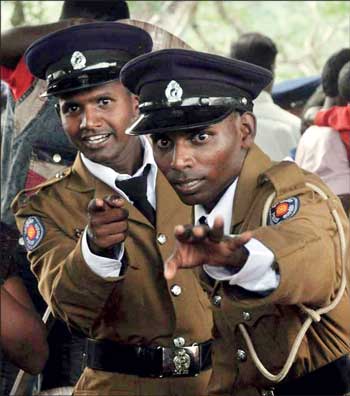Tuesday Feb 17, 2026
Tuesday Feb 17, 2026
Saturday, 13 September 2025 00:00 - - {{hitsCtrl.values.hits}}
 |
| The HRCSL recognises that the Sri Lanka Police play a vital role in maintaining law and order and safeguarding public security |
The Human Rights Commission of Sri Lanka (HRCSL) has formally written to Public Security and Parliamentary Affairs Minister Ananda Wijepala, presenting a set of recommendations aimed at strengthening the institutional capacity of the Sri Lanka Police to effectively uphold the rule of law while ensuring compliance with international human rights standards.
Invoking its mandate under Section 10(d) of the HRCSL Act, No. 21 of 1996, the Commission called on the Government to take urgent measures to improve resource allocation, training, performance evaluation systems, and administrative reforms within the Police Department.
HRCSL’s key observations
The HRCSL recognises that the Sri Lanka Police play a vital role in maintaining law and order and safeguarding public security. Over the past year, the Commission has engaged in constructive dialogue with the present Inspector General of Police (IGP) and other senior officers, resulting in several positive institutional developments.
These include the issuance of internal circulars based on HRCSL’s recommendations, covering areas such as:
The Commission has also conducted district-level capacity-building programs for senior Police officers on critical themes, including the prevention of torture, the protection of detainees’ rights, and community policing approaches. Officers’ responses have been positive, indicating an institutional willingness for reform.
Furthermore, through its National Preventive Mechanism (NPM), the HRCSL has conducted regular monitoring visits to police stations across the country to identify systemic challenges and make targeted recommendations to prevent torture and ill-treatment in custody.
Key recommendations
A. Enhanced resource allocation
The HRCSL observed that many Police stations are significantly under-resourced, limiting operational efficiency and affecting compliance with human rights obligations. The Commission recommends:
1. Comprehensive needs assessment
2. Budgetary Measures the HRCSL urges the Ministry to collaborate with the Treasury to secure increased resource allocations for the Police Department in the upcoming Annual Budget.
B. Institutional reform in performance evaluation
The HRCSL has expressed concern over reports that informal ‘arrest targets’ are still used to measure Police performance in some districts, which may inadvertently encourage arbitrary arrests and undermine public confidence in law enforcement.
The Commission reiterates its General Guidelines and Recommendations No. 1 of 2025 to Sri Lanka Police on Preventing Custodial and Encounter Deaths stating: ‘Arrests should not be carried out in an arbitrary manner. Every Police officer who makes an arrest must justify its necessity based on reasonable suspicion, supported by a preliminary investigation.’
Instead, the Commission recommends replacing arrest-based evaluations with objective performance indicators, including:
These reforms will help ensure that Police performance is assessed based on efficiency, professionalism, and public trust rather than purely numerical targets.
The Commission remains committed to providing its advice and assistance to strengthen administrative practices that uphold the protection and promotion of human rights in Sri Lanka. A copy of this letter has also been forwarded to President and Defence Minister Anura Kumara Disanayake, Justice and National Integration Minister Harshana Nanayakkara, Inspector General of Police Priyantha Weerasooriya, and Finance, Planning and Economic Development Ministry Secretary to the Treasury Dr. Harshana Suriyapperuma, for their kind attention and necessary action.